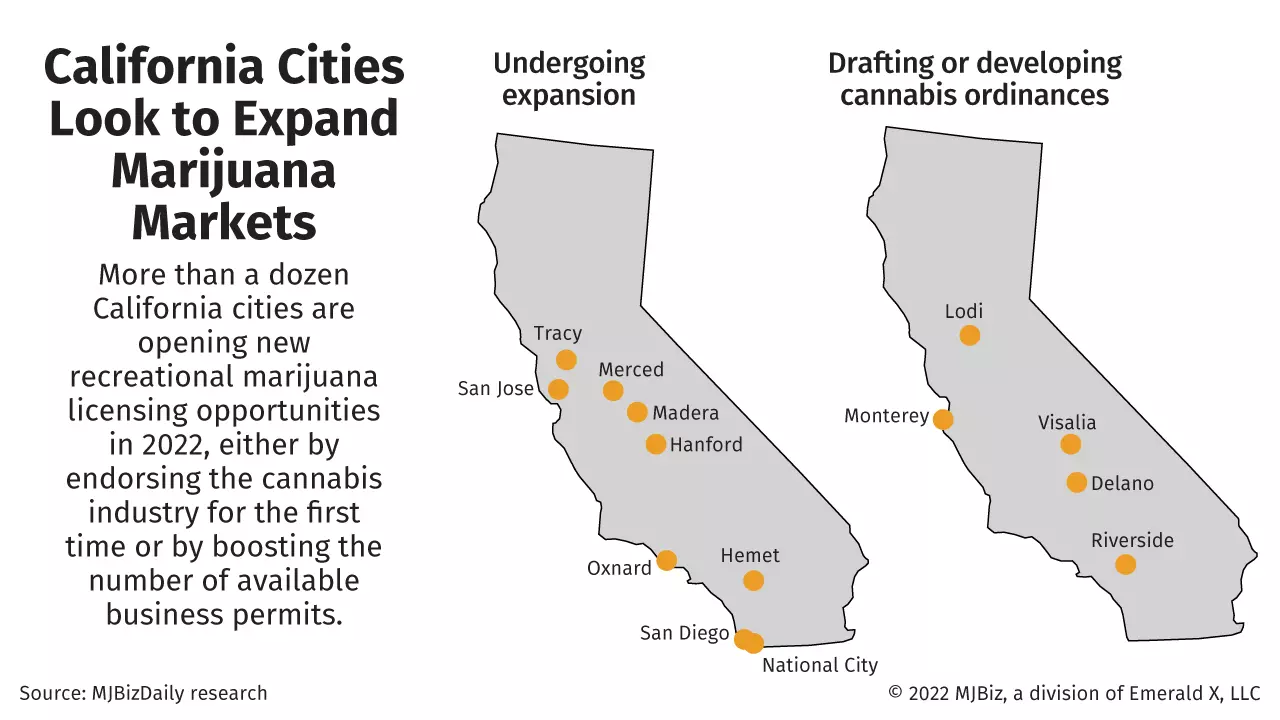Regulated Cannabis Market to Expand in 2022 as More Municipalities Open Up Across California
by Omar Figueroa
January 20, 2021
The year 2022 promises an expansion of licensed cannabis businesses as municipalities open up across California. As noted in “2022 brings new markets, opportunities for California marijuana firms” by Chris Casacchia in MJBizDaily:
More than a dozen California cities are opening new recreational cannabis licensing opportunities this year, either by embracing the legal marijuana industry for the first time or by increasing the number of available business permits.
Several other cities, meanwhile, are laying the groundwork for new markets down the road by drafting and/or developing cannabis ordinances.
The ongoing shift is a welcome sign for the state’s struggling marijuana sector, which remains forbidden in the vast majority of California cities and, at the same time, must compete against a thriving illicit market.
The article features a helpful chart highlighting the more than a dozen cities
which are “opening new recreational marijuana licensing opportunities in 2022, either by endorsing the cannabis industry for the first time or by boosting the available number of permits.”
The article notes that “retail expansion across the state is far and wide, from urban centers in San Diego and San Jose to small towns such as Madera in the Central Valley and Oxnard along the Sourthern California coast.”
An example is the City of Madera, about 25 miles north of Fresno. At the end of 2021, after much deliberation, the City Council finally voted to pass its cannabis business permits ordinance. See, “After long wait, Madera OK’s application process for pot shops” by Daniel Gligich in the San Joaquin Valley Sun. Madera’s ordinance allows two social equity licenses and six standard retail dispensaries, as well as an unlimited number of vertically integrated licenses, which reportedly only require approval from city administration and not the city council.
By comparison, the MJBizDaily article reports, “Hemet, a midsized town in Riverside County that’s struggled to recover from the Great Recession of 2007-2009, has foregone licensing caps altogether and is instead relying on zoning allowances to dictate the number of retail outlets.”
Follow up research by Omar Figueroa found the “City of Hemet’s Commercial Cannabis Business Portal” with applications, FAQ’s, approved documents (including cannabis business ordinance, tax rates, application fees, and review criteria), and maps, graphics & charts. At this time, the application window in Hemet remains open.
National City, bordering the City of San Diego to the south, is also discussed in the MJBizDaily article:
Applicants in National City may apply for retail, cultivation, distribution, manufacturing and transportation permits, ushering in a new era of commercial activity.
Retail applicants are required to operate at least one other marijuana business on the property, according to the ordinance, and must limit the retail portion to no more than 40% of square footage.
National City plans to start accepting applications this quarter, with a few notable caveats: Officials plan to favor local ownership, and at least one of the six licenses will be set aside for a consumption lounge operator.
Follow-up research shows that National City, like Hemet, also has an official web site providing “Commercial Cannabis Information” with a copy of the cannabis ordinance and FAQ’s.
San Diego is also showcased as an underserved market with a significant population by MJBizDaily:
San Diego, an underserved market considering its large population, is among several California cities with established commercial cannabis programs looking to expand.
The state’s second-largest city, with nearly 1.4 million residents, appears poised to lift several of its zoning restrictions, including narrowing a 1,000-foot buffer between marijuana businesses and parks, libraries, places of worship and playgrounds.
The constraints, critics contend, are a major reason why the city has opened only 25 dispensaries, despite approving 36 in 2014.
If those restrictions are eased, which could come within the next month or so, retail licenses could expand nearly 40%, according to The San Diego Union Tribune.
Our research shows that the City of San Diego also maintains a comprehensive web site designated “Cannabis Information” to ease the application process for hopeful operators once the proposed changes are implemented.
Another large city looking to expand is the Silicon Valley hub of San Jose. According to MJBizDaily:
The Northern California city of a million residents has only 16 dispensaries.
The San Jose City Council is weighing a policy overhaul to boost retail and delivery locations to 42 while eliminating several zoning restrictions and easing others.
The tech mecca is also looking to create new business opportunities for social equity applicants.
We found the details of the draft policy proposal on the City of San José’s web site at “Cannabis Business Ordinance Update.”
Oxnard is another city which is expected to see explosive growth in licensed dispensaries, with sixteen dispensaries anticipated to be open by the end of the year, according to MJBizDaily:
Oxnard, located along the coast in Ventura County, issued six additional retail licenses last year with three dedicated to local equity applicants.
The agricultural town – perhaps best known for hosting the Dallas Cowboys’ summer training camp, which draws thousands of fans every year – is expected to have 16 dispensaries open by year’s end.
Our research found the City of Oxnard’s “Cannabis” page, which shows that the application window for retail cannabis dispensaries in Oxnard is now closed and the 16 finalists have been selected out of a pool of 51 applicants.
MJBizDaily mentions other cities in the process of drafting and/or developing cannabis ordinances, including Monterey, Riverside, Lodi, Delano, and Visalia, as well as cities which are expanding their existing cannabis ordinances, including Tracy (seven additional retail permits), Merced (one additional storefront license), and Hanford (one additional retail location and unlimited cultivation, manufacturing, lab testing, distribution and microbusiness permits.)
This expansion in cannabis business opportunities across California will provide more outlets for cultivators and manufacturers to sell their goods, expand safe access to tested cannabis for thousands of adult consumers who previously had no choice other than the illicit market, and allow entrepreneurs to establish or expand retail operations. At the same time, these changes at the local level present a rare opportunity to shape the local regulatory landscape by advocating for improved cannabis policies while the marketplace is being created.
Entrepreneurs who are thinking about submitting applications in 2022 would be wise to consult with and retain legal counsel with extensive experience in the field.
This information is provided as a public educational service and is not intended as legal advice. For specific questions regarding cannabis business permits, permit applications, cannabis ordinance drafting, or policy advocacy, please contact the Law Offices of Omar Figueroa at 707-829-0215 or info@omarfigueroa.com to schedule a confidential legal consultation.
ATTORNEY ADVERTISING: This post constitutes an attorney advertisement. The attorney responsible for this advertisement is Omar Figueroa.

